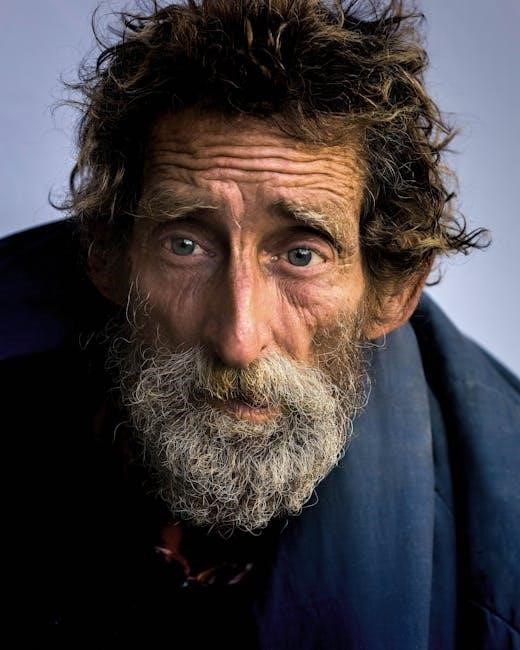Hannah Arendt’s The Human Condition is a profound exploration of human activities‚ examining labor‚ work‚ and action. It offers insights into the vita activa and modern humanity’s challenges.
Historical Context and Key Themes
The Human Condition‚ published in 1958‚ emerged amid the intellectual and political upheavals of the post-war era. Arendt’s work reflects her deep engagement with the crises of modernity‚ including the rise of technological society and the decline of traditional frameworks for understanding human existence. Central to her analysis is the concept of the vita activa (active life)‚ which she divides into labor‚ work‚ and action. Arendt critiques the modern world’s tendency to prioritize labor over other human activities‚ arguing that this shift undermines the political and creative potential of human beings. She also emphasizes plurality as a fundamental aspect of human existence‚ asserting that the diversity of human experiences is essential for meaningful political life. This text remains a cornerstone of political philosophy‚ offering profound insights into the challenges of modern society and the enduring questions of human agency and freedom.

The Vita Activa: Labor‚ Work‚ and Action
The Vita Activa examines labor‚ work‚ and action as fundamental human activities‚ each shaping existence uniquely in Arendt’s framework.
Labor: The Biological and Necessary
Labor‚ in Arendt’s framework‚ is the most fundamental human activity‚ driven by biological necessity and the need for survival. It is repetitive and cyclical‚ tied to the body’s requirements for sustenance and reproduction. Labor is not creative or enduring; it is consumed by the life process itself‚ leaving no lasting trace. Arendt distinguishes labor from work and action‚ emphasizing its role in maintaining life rather than creating a lasting world. This biological imperative is universal‚ shaping human existence across time and culture. Labor‚ for Arendt‚ is the foundation of the vita activa‚ yet it remains bound to the private sphere‚ unseen and unremarkable compared to the public realm of action.

Work: Creativity and the Artificial World
Work‚ as conceptualized by Arendt‚ represents humanity’s creative capacity to shape the world. Unlike labor‚ which is driven by biological necessity‚ work involves the fabrication of objects and the creation of an “artificial world.” This activity is characterized by its durability and permanence‚ producing things that outlast the immediate needs of life. Through work‚ humans construct a shared‚ tangible environment that provides stability and meaning. Arendt emphasizes that work is distinct from both labor and action‚ as it is neither purely biological nor political. Instead‚ it lies in the realm of creativity and craftsmanship‚ enabling humans to transcend their natural existence and leave a lasting imprint on the world. This artificial world‚ built through work‚ becomes the backdrop for human life and interaction.
Action: Freedom and the Political Realm
Action‚ according to Arendt‚ is the highest and most distinctly human activity‚ embodying freedom and the political. It involves collaborative expression and collective initiative‚ enabling individuals to transcend private interests and shape the public sphere. Unlike labor and work‚ action is uniquely tied to human plurality‚ as it requires the presence of others to achieve meaningful outcomes. Arendt argues that action is the cornerstone of political life‚ fostering the creation of new beginnings and the realization of human potential. Through action‚ individuals establish their identities and contribute to the shared world‚ making it a vital component of the vita activa. This realm of freedom and collective engagement is what truly defines human existence and distinguishes it from other forms of activity.

The Concept of Plurality in Human Existence
Hannah Arendt defines plurality as the fundamental condition of human existence‚ emphasizing that human beings are multiple‚ distinct‚ and share a common world of experience and action.
Plurality as the Foundation of Human Condition
Hannah Arendt posits that plurality is the cornerstone of the human condition‚ arising from the diversity of individuals and their unique perspectives. She asserts that human beings are not solitary entities but exist in a shared world‚ where interaction and communication foster a rich tapestry of experiences. This plurality is not merely a biological fact but a fundamental aspect of human existence that underpins political and social life. Arendt argues that the recognition of plurality is essential for understanding human dignity and the potential for collective action. Without plurality‚ human existence would lack the vibrancy and creativity that define our species‚ leading to a monotonous and isolated existence devoid of meaningful engagement.

The Modern Age and ItsImpact on Human Activities

The Modern Age and Its Impact on Human Activities
The modern age‚ as Arendt observes‚ has reconfigured labor‚ work‚ and action‚ diminishing the political realm and prioritizing economic productivity over human freedom and plurality.
Reconfiguring Labor‚ Work‚ and Action in Contemporary Society
In contemporary society‚ the distinctions between labor‚ work‚ and action have become increasingly blurred. Automation and technology have transformed labor into a more abstract concept‚ often detached from physical necessity. Work‚ once tied to the creation of a lasting artificial world‚ is now frequently reducible to commodified services. Action‚ the highest form of human activity in Arendt’s framework‚ is often overshadowed by bureaucratic processes and the dominance of economic productivity.
This reconfiguration reflects a broader societal shift away from the political realm‚ where action once flourished. The rise of consumer culture and technological dependency has further eroded the spaces for collective action and plurality. Arendt’s analysis underscores the urgency of reclaiming these dimensions to restore human freedom and dignity in a rapidly changing world.

Political Implications of Arendt’s Philosophy
Arendt’s philosophy underscores the political significance of action and plurality‚ emphasizing the necessity of collective engagement and public discourse to sustain democratic life and human freedom.
Action and the Public Sphere
Action‚ as defined by Arendt‚ is the highest form of human activity‚ transcending labor and work by enabling individuals to collaborate and express themselves collectively. It is within the public sphere that action finds its true meaning‚ fostering freedom and plurality. Arendt argues that the public sphere is essential for political life‚ as it provides the space where individuals can come together‚ share perspectives‚ and engage in meaningful dialogue. Through action‚ individuals create a shared reality and establish their unique identities‚ which are vital for a vibrant democracy. The erosion of the public sphere‚ Arendt warns‚ threatens the very foundation of political freedom and human dignity‚ making action and collective engagement more crucial than ever.

Contemporary Relevance of “The Human Condition”

The Human Condition remains highly relevant today‚ offering insights into modern challenges like political polarization‚ technological dominance‚ and social isolation. Arendt’s ideas continue to inspire critical thinking about human activities and their impact on society‚ emphasizing the importance of plurality and collective action in addressing contemporary issues. Her work serves as a timeless framework for understanding and navigating the complexities of the modern world‚ making it a vital resource for scholars and the general public alike. The book’s enduring relevance underscores the necessity of revisiting Arendt’s philosophical contributions to confront the evolving challenges of our era effectively.
Applying Arendt’s Ideas to Modern Challenges
Hannah Arendt’s concepts of labor‚ work‚ and action provide a framework for addressing contemporary issues like automation‚ climate change‚ and political polarization. Her emphasis on plurality and the public sphere highlights the importance of collective action in overcoming societal challenges. By distinguishing between repetitive labor and meaningful work‚ Arendt’s ideas encourage rethinking productivity in the age of technology. Her philosophy also underscores the need for ethical engagement in public life‚ offering insights into how individuals can reclaim their political agency. Arendt’s work remains a vital resource for understanding and responding to the complexities of modern life‚ inspiring new perspectives on human activity and its impact on the world.
